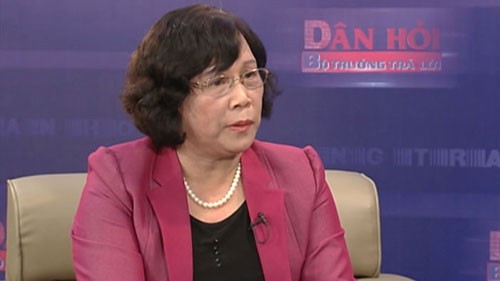(VOVworld)- The Vietnamese Party and State have always paid special attention to those who rendered great service to the nation. This reflects the Vietnamese tradition of “Drinking water, remember its source”. Over the past few years, many policies for social beneficiaries have been adopted and adjusted according to national development. Minister of Labor, Invalids and Social Affairs Pham Thi Hai Chuyen, during a recent “People ask, Ministers replies” program, said that this year Vietnam will further strengthen its policies for those who rendered great service to the nation..

Minister of Labor, Invalids and Social Affairs Pham Thi Hai Chuyen |
There are more than 8 million social beneficiaries in Vietnam. 1.5 of them receive regular allowances. Every year, the State allocates a significant amount of its budget to social beneficiaries and social resources have been mobilized to care for them.
Benefits have been expanded according to national development
The Vietnamese Party and State have granted several benefits and preferences to social beneficiaries. They receive financial assistance through different channels including monthly allowances according to the average level of social spending and government regulations.
From 2008 to 2013, the Government adjusted the standard level of allowances for social beneficiaries 7 times, raising it from 23 USD per month in 2007 to 59 USD per month. The minimum wage is 55 USD per month.
In addition to allowances, the State also allocates millions of USD to build houses, subsidize health care and education, provide credits, and generate jobs for social beneficiaries and their families.
The movements of “Showing gratitude”, “Drinking water, remember its source”, and “Caring for invalids and social beneficiaries at the communal level” have been widely supported. 97% of those who rendered great service to the nation enjoy a living standard at or above the national average level. Ms Chuyen says: “The Vietnamese Party and State have exerted efforts to make policies for social beneficiaries more effective. These policies have helped improve social beneficiaries’ living conditions”.
Fine-tuning policies for social beneficiaries
Vietnamese policies for social beneficiaries changed a lot between 2012 and 2013. Since 2013, social beneficiaries have enjoyed additional preferences from Party and State policies. Within the next two years, the largest ever review of these policies will be carried out, affecting about 4.8 million people in 11,000 communes nationwide. The review reflects the Party and State’s care for social beneficiaries. Ms Chuyen again: “This is the first time we have conducted a general review covering such a large number of social beneficiaries. The war ended long ago. Policies on social beneficiaries have been adjusted several times with different levels of preferences. Thanks to economic growth, the level of preferences has been expanded and the number of social beneficiaries increased. We have cooperated with the Vietnam Fatherland Front to mobilize other resources, especially social organizations, to assist social beneficiaries. With this review, we want to make sure our policies reach all social beneficiaries”.
This year the Ministry of Labor, Invalids and Social Affairs will carry out a Project to identify remains of martyrs and work with the Ministry of Construction to build houses for social beneficiaries, whose houses are unstable or badly damaged. The Ministry plans to set up networks at the grassroots level to assist social beneficiaries.
Effective policies will help millions of people who rendered great service to the nation improve their lives and at the same time ensure social security and promote the Vietnamese tradition of mutual assistance.